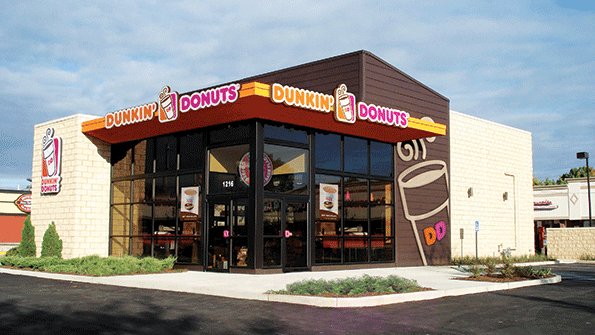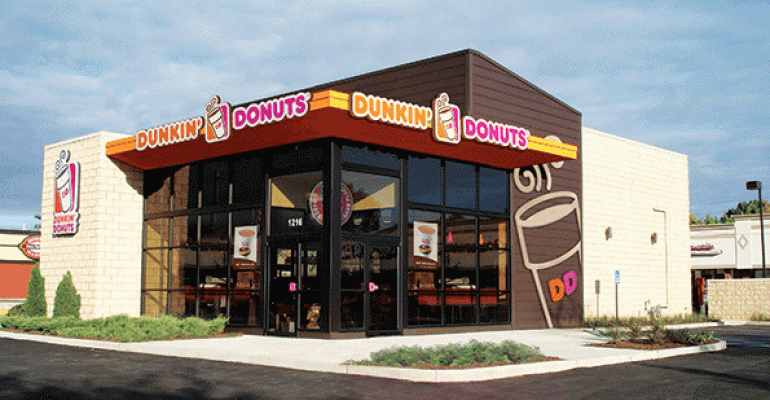Modest increases in same-store sales at Dunkin’ Donuts and Baskin-Robbins restaurants was driven by price increases as traffic slowed, especially in the afternoon, parent company Dunkin’ Brands Group Inc. reported Thursday.
Chairman and CEO Nigel Travis said some franchisees raised prices too aggressively in response to rising labor costs, especially in the Dunkin’ Donuts stronghold in the northeast. As a result, Travis said, prices were up by 380 basis points in the first two quarters, at a time when consumers continued to show price sensitivity. The result was a 2.9 percent increase in average checks and a 1.4 percent decrease in traffic.
For the second quarter of 2016, ended June 25, domestic Dunkin’ Donuts locations saw a 0.5 percent increase in same-store sales and Baskin-Robbins locations in the United States saw same-store sales grow by 0.6 percent.
Systemwide net income was up by 17.2 percent to $49.6 million, or 57 cents per share, compared to $42.3 million or 44 cents per share in the second quarter of 2015. Revenue was up by 2.3 percent.
“While we are disappointed with our topline revenue growth in the second quarter, we are pleased that we were able to grow both operating income and earnings per share at a significantly faster pace than revenue in the second quarter,” Travis said. “As for our five-part plan designed to drive Dunkin’ Donuts U.S. comparable store sales growth, while we are still in the early phases of implementation and have not yet seen an acceleration in topline sales, we are making significant progress with our initiatives.”
That plan includes driving the chain’s image as a coffee authority, faster-to-market food innovation, “targeted value offerings and everyday smart pricing,” increased use of digital technology and improving the guest experience.
Travis said he was “especially delighted with our efforts to continue to build our coffee authority, as evidenced by the second quarter growth in our espresso category and the launch [starting in June in New York and Los Angeles] of our Cold Brew coffee, and we continue to improve the guest experience through digital technologies like On-The-Go mobile ordering that enables DD Perks members to order in advance and skip to the front of the line.”
He said espresso-based beverage sales had enjoyed double-digit growth, but declined to provide further details. However he did point out that now all espresso beverages at Dunkin’ locations in the U.S. and 16 other countries were made from Rainforest Alliance Certified beans, an announcement the company made last week.
He added that the cold brew coffee seemed to appeal to Millennials in particular and “early results suggest that sales of this product are incremental to sales of our regular iced coffee.”

He said the cold brew enjoyed a solid repurchase rate and added that they would roll it out nationally by the end of the summer.
In food innovation, he said the Grande Burrito, introduced in the first quarter, was a successful limited time offer, as was the newly launched Bacon Supreme Omelet.
In the upcoming quarter, he said the chain would be rolling out better tasting eggs. The company also was planning to get a reformulated bagel in test this year, Travis said, along with revamped “better tasting, more robust” bacon.
The company’s K-cup sales were performing well, with sales up by 3.9 percent.
Dunkin’ Donuts also relaunched its ordering app in early June that allows for advanced ordering and payment.
“We can offer an entirely new level of speed and convenience to our guests,” Travis said.
Baskin-Robbins benefited from the warm cookie ice cream sandwiches introduced March 1, as well as good-grab-and-go cookie sales and online cake orders that were up with “mid single digit growth.”
Dunkin’ Donut franchisees opened a net 82 units in the United States in quarter, and Baskin-Robbins opened a net 12 locations.
Looking forward, chief financial officer Paul Carbone said he hoped price increases would stabilize to 300 basis points for the whole year and that, while restaurant growth would continue, it was slowed by uncertainty around the political climate.
“It’s all about, for many of our franchisees, the level of uncertainty, whether it be on the political front, minimum wage, different bills being introduced that may impact their profitability,” Carbon said. “That concern still exists for many, and while we remain pretty confident, not only this year but going into next year, about our development growth, no big surprise: There is some concern among our franchisees.”
Travis added that the uncertainty made franchisees cautious about opening new locations.
“When you talk to franchisees [they say] ‘I’m thinking of opening, say, three stores next year. I’m pretty certain on this one, I’m pretty certain of that one, the other one I would have done, but we’ve got so much regulation, political uncertainty; we’re not sure who’s going to be in charge in this state or nationally,’ so they’re sitting on the fence on some of these sites,” he said.
Contact Bret Thorn at [email protected]
Follow him on Twitter: @foodwriterdiary





